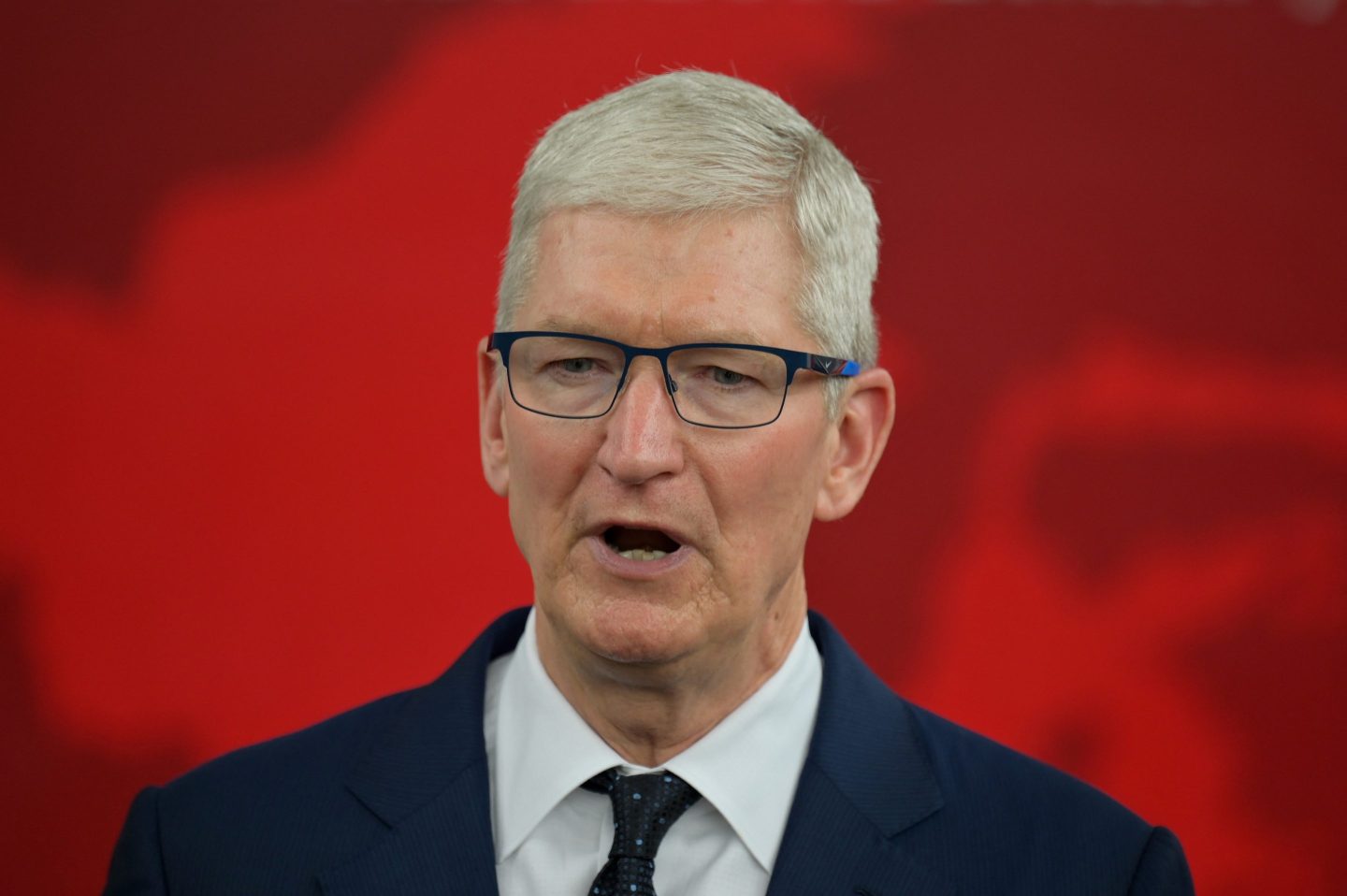No pressure, Apple.
The iPhone maker’s WWDC conference starting on Monday will be pivotal to the company’s future. CEO Tim Cook must reassure customers, developers, and investors that Apple can narrow the gap with its rivals in the only thing that seems to matter in the tech industry these days: artificial intelligence.
He has his work cut out for him.
Over the past year, the parent companies of Google and Facebook, along with Microsoft its upstart ally OpenAI, have unleashed a torrent of large language models and AI-infused products. Sure, some of those products have been buggy and occasionally spouted nonsense, but they showed that the companies behind them are at least striving, and, in some cases, sprinting ahead.
Meanwhile, Apple has been mired in the AI mud. The company has made relatively few AI-related upgrades to its products, leaving its executives to repeatedly—and not so convincingly—promise big things to come.
Absent something soon, Apple’s lineup of devices and services risks becoming obsolete. Customers, after all, could easily switch to buying lower-priced electronics from rivals that can do significantly more.
If the news leaks are to be believed, Apple will use WWDC—described by Wedbush tech analyst Dan Ives in a recent research note as “the most important event for Apple in over a decade”—to sprinkle AI magic across its portfolio. If you’re allergic to hearing the term AI, well, avoid the event’s livestream.
Voice assistant Siri, once an AI trailblazer, but now only marginally useful because it can handle a limited number of tasks, is expected to get a high-profile update. For the first time, users will be able to tell Siri to access any feature within other apps, such as opening documents or sending an email, vastly increasing Siri’s utility.
You can count on Apple to also brag about more minor AI upgrades. Voice memo transcriptions, automated replies to messages, and AI-generated emojis are just some of what’s on tap, according to Bloomberg.
Apple will likely power some of the updates through a new partnership with OpenAI. The deal would let Apple integrate OpenAI’s ChatGPT chatbot into various Apple products, thereby supercharging Apple devices with additional AI capabilities. Using such outsourced technology could help Apple catch up to the competition. But it would also hammer home that Apple, embarrassingly, lacks an in-house equivalent, while also adding to OpenAI’s already considerable momentum.
Apple investors are already lapping up the idea of a would-be AI renaissance, to be marketed under the brand name “AI Intelligence,” according to Bloomberg. Apple’s shares have risen 15% since May 1, and are near an all-time high.
But before everyone gets overly giddy, here’s a few words of caution. Apple’s revenue has declined in five of the six most recent quarters, partly because of falling iPhone sales in China. Apple can add all the AI it wants, but it won’t necessarily solve the China problem, which is mostly about politics and Chinese customers switching to lower-priced Chinese-made smartphones—and not about AI.
Furthermore, despite all the whiz-bang on stage on Monday, many of Apple’s major AI upgrades aren’t expected to be available until much later this year, when iOS 18 is released—and only as beta-stage products. Any boost in sales from shoppers rushing to buy Apple devices that are powerful enough to handle all the AI will therefore be delayed.
And even after cramming AI into everything it produces, Apple will still face serious competitive challenges. Rivals have added or will soon add many similar AI features to their own devices, which means Apple’s efforts will merely help it keep pace rather than gain an advantage.
So, as I said earlier, facetiously, no pressure, Apple.
Verne Kopytoff
Want to send thoughts or suggestions to Data Sheet? Drop a line here.
Today’s edition of Data Sheet was curated by David Meyer.
NEWSWORTHY
Uproar over Adobe. The software maker is facing an uprising over a new language in its terms of service for customers who use one of its key products, Creative Cloud Suite, according to 9to5Mac. The new language says the company may “access, view, or listen to your Content through both automated and manual means,” including machine learning in order to improve Adobe’s services. Some users fear Adobe is giving itself permission to train its AI models on their work, such as professional photography and movie clips. Adobe responded to the dustup by saying the language is meant for policing of content that violates its terms of service, like images of child abuse, and that it doesn’t train its AI on customer content.
Oracle’s bad review. U.S. Veterans Affairs employees gave Oracle’s medical records software a seal of disapproval, with only one in five saying that the product lets them deliver “high-quality care.” The survey’s findings were published in an internal VA report, according to Bloomberg. The poor showing calls into question the department’s $16 billion contract with Oracle and Oracle’s $28 billion acquisition in 2022 of Cerner, a provider of electronic medical records.
Amazon and Russia sanctions. A former Amazon Web Services worker has accused the company of breaching U.K. sanctions by selling facial recognition tech to a Russian company after Russia’s sanctions-triggering 2022 invasion of Ukraine. According to the Financial Times, Charles Forrest told a London employment tribunal that he was unfairly sacked after blowing the whistle to British authorities. Amazon denies his claims.
IN OUR FEED
30%
—The year-on-year lift in TSMC’s May sales, as the world’s biggest contract chipmaker cashes in on the AI chip boom and a revival in smartphone shipments.
IN CASE YOU MISSED IT
Layoffs, abusive calls, and AI fears: Inside the front lines of Amazon’s ‘customer obsession’ promise, by Jason Del Rey
British tech baron Mike Lynch not guilty of HP-Autonomy fraud in remarkable courtroom redemption, by Bloomberg
Tesla shareholder’s vote on Elon Musk’s record $56 billion pay deal could be his ‘last stand’ as CEO, experts warn, by Christiaan Hetzner
Samsung’s largest union goes on strike for the first time in the company’s 55-year history, by Bloomberg
A UN Report on AI and human rights highlights dangers of the AI revolution—and our own power to prevent substantial harms, by Sage Lazzaro
Microsoft’s Satya Nadella is the leader Fortune 500 CEOs admire most. This management philosophy helps explain why, by Orianna Rosa Royle
BEFORE YOU GO
Microsoft's Recall concession. After U.K. and EU privacy regulators got on Microsoft's case over the way it planned to roll out the Recall function in the new class of Copilot+ PCs—the tool will take constant snapshots of what users do, to enable an AI-powered photographic memory—the company has changed tack. In a blog post today, Microsoft said Recall would be opt-in rather than opt-out, and also that it was adding new layers of encryption to the stored snapshots (security experts had found it would have been fairly easy for hackers to extract this information).












